
By Kira Weaver, Staff Writer
House shows and the communities created within them have long been an essential part of the college experience – or simply life experience – for the many that attend them. In reference to myself, they have played the role of giving me a collection of individuals I never knew I needed around till introduced. I can only hope, as a reader, you take the time to seek out these spaces, and are gifted with an experience parallel to mine.
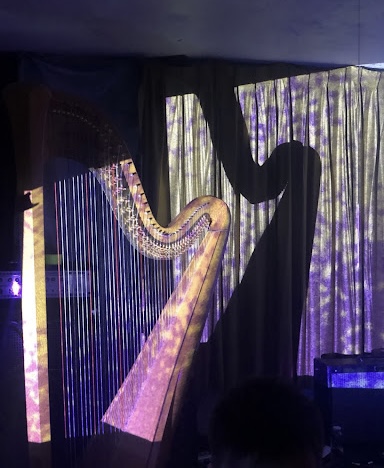
TOURIST TRAP
I was first convinced to go see an artist known as Maiden China, a harpist whose talents I had heard rumorings of in the week prior, three springs ago now. I remember walking from the train with students who had been intrigued by the same promises. The house loomed on a slight incline as we approached from the front, giving the younger version of myself the feeling of a foreshadowed longevity in
comparison to others I had frequented that preceding winter and fall.
Reflecting on this feeling last Friday, I walked down a familiarized pattern of uneven stairs in the worn-out leather of my dark green cowboy boots, through steel cellar doors propped open wide like a hug from a long time friend. The Tourist Trap had upheld it’s initial promise.
With the countless versions of myself that have entered this space, waiting in line looking at the eyes reflecting back at me in an elongated horizontal mirror surrounded by what I imagine are writings from other frequenters, I find comfort in knowing that some things about the house will always stay the same. Most notably the red hue that a singular lightbulb casts onto the given night’s crowd.
As faces that don’t look new but also don’t look old fade in and out of my peripheral vision, I know I am not the only one that finds solace in getting their hand marked with the pi-like symbol, representative of the two T’s that this house has chosen.
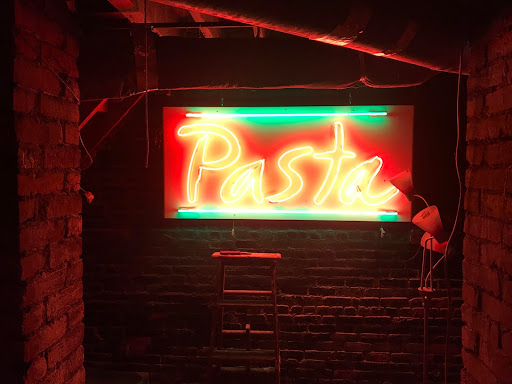
PASTA PLANET
A once fully lit neon sign, now only able to spell out “PAS,” is put on view for all party-goers to see.The red glow of those three letters enthralls me with its reaction to the pattern on the couch cushions below. The vibrancy of their light creates a shift, pulling me in so that I almost do not
hear the start of the second set. But I do, and I pull myself up. Up off the couch, up away from the sign, I head towards the sound.
The band in front of me is centered in the middle of a cement box, walls surrounding them to every side except out. The setup is reminiscent of dioramas made in my youth. A white sheet hangs behind the band, an attempt to help draw the eye back to the visuals cued as they play.
Nearing the stage wall now, the thumb of my right hand begins to trace the outline of painted figures, the aliens that live on Pasta Planet. And it’s then that I am reminded of just how long this place with these people have been here. Some of the roommates live as migrants from the “Green Thumb,” an older house that predates this one in Allston. You can tell they’ve been at this for a while. Just close your eyes and listen to the sound for a second and it’s clear. Aaron Brown and Ryan Katz have been with the place since its very beginnings. Running a recording studio up above, the two sound engineers themselves consider quality of sound their priority.
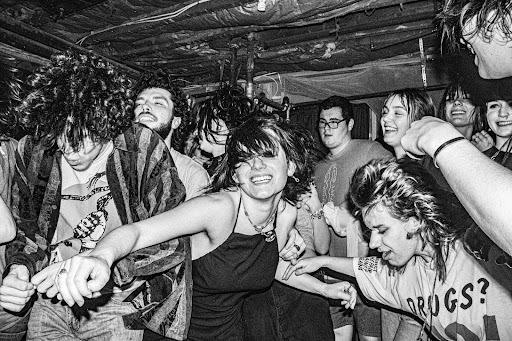
BRINSTAR
There’s this level in a video game, Super Smash Brothers, called Brinstar, where the entirety of the floor becomes submerged by lava. A current occupant of one of the rooms, Matt, talks of how that just “fit the space” when they first
moved; that the floor alone held a multitude of holes accompanied by rusted nails randomly found all throughout. It’s evident to any visitor today how much handiwork they have put into the space.
Off to the side, next to the washer and dryer, is a wall plastered with paper. Staring at it, my internal dialogue picks out the names of people I’ve had the honor to interact with. It’s a scrapbook of setlists from shows past. One that looks as if it has had to have been uncrumpled catches my attention the most. I think of how the residents took the time to retrieve the otherwise discarded object, taping it here among the others.
While observing, I find myself playing pretend, creating a scenario of moving laundry from washer to dryer. Of this being my place of living. I wonder what memories would the wall of memorabilia hold. Would my favorite be made of pink construction paper, stickered with stars? Or rather the one you can tell was rushed on the yellowed graph paper near the bottom?
As I lay outstretched on my apartment floor now writing this, thinking of that wall, I am reminded of a friend who played last weekend. How their setlist is now taped to that wall. And how when deciding what house would cultivate the best environment for their work, they chose Brinstar.
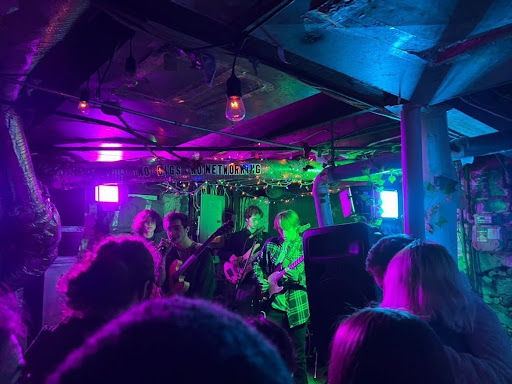
TURKEY TEMPLE
“No Cigs, No Networking” says the pipe cushioned, then wrapped in duct-tape above the front of the crowd. As I stand in the back rereading this statement, my body leaning into the basement wall, I am reminded of all the details about this place that allow it to capture a more
home-like quality than its counterparts.
I turn my head to peer over my left shoulder. My eyes momentarily wander away from the stage. I focus in on a girl that can be seen through a doorway that leads out to the initial entrance. Younger than me, she hangs her coat on a homemade rack, consisting of an already strained wire and donated hangers from the housemates. She passes under the door’s frame now, into the same space my body occupies. She stops to the left of the entrance to observe a set of shelves, painted white and filled with tiny individualized markings of color. After looking it up and down and reading a few of its words, she bends to where a paintbrush is placed to add her own. I wonder if she notices mine amongst the many. I lose her when she joins the crowd and my eyes focus back onto where they were originally drawn. The guitarist’s head now facing downwards towards the strings. Everyone has become quiet, and there is a warm lulling sense to the air; it is a softer song.
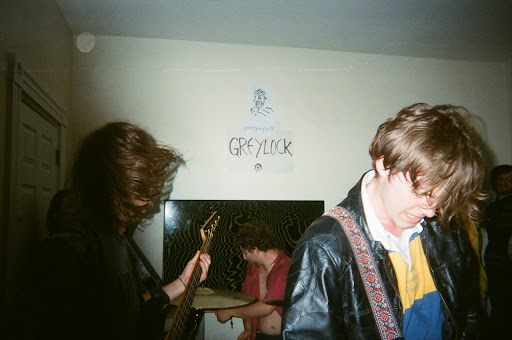
Greylock household on Fridays. A word of wisdom: there is no point in trying to scrub the eye off, as it tends to stick around as a reminder from the night before.
The living room, functioning as a place for the crowd, has the bandmates pushing furniture up against cigarette-infused walls, a visual indication for the venue’s night-time-only inhabitants of how the space functions during the day. Most noticeable, two couches of grayness and sag that sit underneath windows, framed by old warm-toned Christmas lights that flicker unintentionally, looking out onto a streetway of the same name. Although for shows, the blinds of those stay drawn.
Sitting on the couches are your typical twenty-something collegiates, tired from the week of studies that precede their visits, as is the makeup of most of this crowd. They rest their feet and eyes while keeping their ears on the sound found forward and inward.
Stained wooden pillars stand marking a halfway point where the crowd begins to densen and a generalized smell of sweat begins to form. Amature photographers hoist themselves up onto the pillars’ beaten bases in an attempt to capture it all. The only separation of this crowd and the artists that choose to play here, a collection of mic cables and pedal boards.
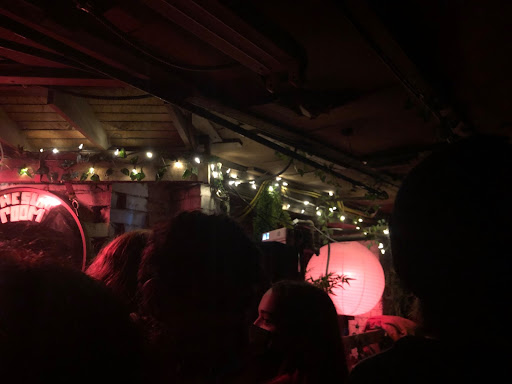
SUNROOM BRIGHTON
Standing at the edge, where asphalt meets street road, I stare down to look at the address given again. Then back up to the dark windows at the end of the driveway, then back down again. I can hear it but I just can't see it. Quella, who had convinced me to come to the show,
starts walking up the driveway. I follow, the voices growing more consistent as we continue. Nestled behind a series of trees, to the right of the house originally seen from the road is a second one of the same stature. Except instead, this one’s porch holds the incandescent glow of a green light. Already through the trees nearing the lighted porch, she turns around, a visual cue we were here.
Inside, as I walked down the basement stairway, my eyes meet parallel with the ceiling, where vines are strung in what appears to be rows. In my mind, they imitate the trees surrounding the outside perimeter. I remember being able to go outside for a breath of fresh air in between sets and look up at the trees moving with the autumn air. Something about that felt rare. Once crammed amongst the crowd again, I noticed a mirror on the far side from where I stand. It’s rounded, an ode to the name given, the wording at the top reading it back to me, “The Sun Room.”
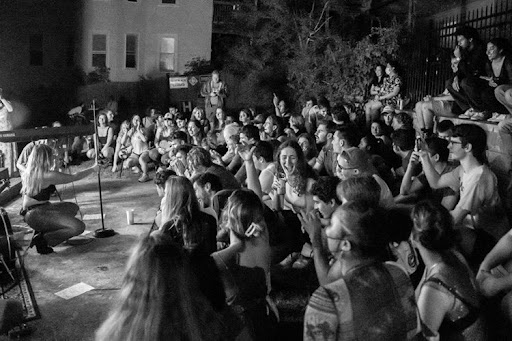
THE TURNPIKE
My legs dangle in the air above the grass that functions as this venue's floor. I sit amongst only a few on a stone ledge, a functional parameter for the outdoor space. As the first band’s song travels back to me, I notice that behind them lives a
collection of signage indicative of this place’s name. The watchers of them unknowingly form an amphitheater now. Close at the front are those sitting knees crossed, legs tucked tight to their bodies. They listen and watch with more detail and focus. Those behind take advantage of their standing to move, their heads nodding rhythmically with the drummer. Only a handful stand on a shed to the farthest corner. They emanate the urge of needing to come away with something distinct about their experience here. A need to be different from the rest of us.
It’s only later on, when sifting through photos given to me for this article, that I notice a narrow path of mirroring apartment complexes with balconies that face inward towards each other, as if the residents are met to communicate back and forth through their windows. One lives unmistakably recognizable from the rest. It is that of a close friend's, who is sadly away for the season. I allow my thoughts to chew on this, ruminating on how noise travels through walls, adding yet another layer of consumption. Can they hear it? Do they go out to gaze down on the people, unseen? Staring at the photo in front of me, I place myself back on the balcony, trying to figure out what The Turnpike would be to them.
In an attempt to respect the above spaces and the people that cultivate them, we have chosen to intentionally not reveal their addresses. A level of discretion is required for them to continue to operate. Instead, it is up to you, the individual, to seek them out.


